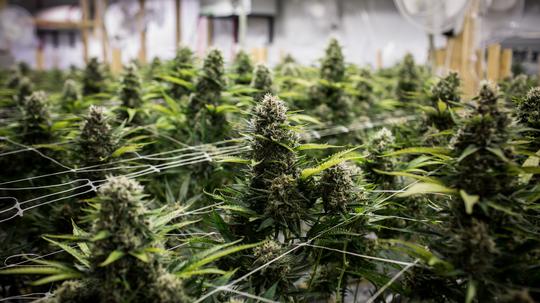
On Monday, the Food and Drug Administration issued a warning letter to Wakefield-based cannabis retail giant Curaleaf Holdings. The federal agency wrote that Curaleaf was illegally selling unapproved products containing cannabidiol (CBD) online with "unsubstantiated claims that the products treat cancer, Alzheimer's disease, opioid withdrawal, pain and pet anxiety, among other conditions or diseases."
Curaleaf has two retail facilities in Massachusetts, one in Hanover and one in Oxford. In Hanover, Curaleaf sells a CBD-containing topical salve that it claims "is commonly used for relieving joint pain, arthritis, and fibromyalgia." At the Oxford store, customers can buy a lavender-scented lotion infused with both THC and CBD "to help alleviate localized aches and pains," the company claims.
In addition to those two product descriptions, Curaleaf appears to have a page—since taken down—at a URL ending in "medication/cannabidiol." Google's cache shows that it included phrases like "CBD was as effective as amisulpride, a standard antipsychotic" and "Effects of cannabidiol in the treatment of patients with Parkinson's disease."
At the bottom of all the product pages on its website, as of Tuesday morning, Curaleaf writes: "This statement has not been evaluated by the FDA. This product is not intended to diagnose, treat, cure, or prevent any disease."
Evidently, that may not be enough for the FDA.
In its letter, the FDA cites several examples of unsubstantiated medical claims made by Curaleaf, including:
- "CBD was effective in killing human breast cancer cells."
- "CBD has also been shown to be effective in treating Parkinson's disease."
- "CBD can also be used in conjunction with opioid medications, and a number of studies have demonstrated that CBD can in fact reduce the severity of opioid-related withdrawal and lessen the buildup of tolerance."
- "What are the benefits of CBD oil? …. Some of the most researched and well-supported hemp oil uses include …. Anxiety, depression, post-traumatic stress disorders, and even schizophrenia …. Chronic pain from fibromyalgia, slipped spinal discs . . . Eating disorders and addiction . . .."
Curaleaf has 15 working days to tell the FDA how exactly it plans to correct these violations.
In a statement issued Tuesday, Curaleaf said it would meet that deadline and "work collaboratively with the FDA" to address any outstanding issues.
"Compliance is a top priority for Curaleaf and the Company is fully committed to complying with FDA requirements for all of the products that it markets," the statement said. "We can affirm that nothing in the letter raises any issues concerning the quality and consistency of any Curaleaf product or calls into question the high safety standards of the Company's cultivation and manufacturing processes. Curaleaf CBD products are all derived from hemp and meet the requirements of the Farm Bill."
The FDA's letter is part of a larger effort to crack down on bogus medical claims made by cannabis retailers. So far this year, the agency has sent similar warning letters to three other companies, including New Jersey-based Advanced Spine and Pain, Washington state-based Nutra Pure, and Florida-based PotNetwork Holdings. It has sent several dozen since 2015.
Relatively little is known about the safety and efficacy of CBD, given scientists' limited ability to research the substance. (It is federally classified as a Schedule I drug, which researchers need approval from both the FDA and the Drug Enforcement Administration to study.) Today, only one CBD medication has been approved by the FDA: Epidiolex, which was developed by a British company to treat two rare forms of epilepsy.
Last week, the agency published a consumer update recognizing "the significant public interest in cannabis and cannabis-derived compounds, particularly CBD" and outlining how it plans to address "unanswered questions about the science, safety, and quality of products containing CBD."
The FDA isn't the only regulatory agency Curaleaf may have problems with. Last month, as the Boston Business Journal reported, state regulators with the Massachusetts Department of Agricultural Resource released guidance that outlaws the sale of all CBD-infused products and tinctures, forcing local businesses to take those products off their shelves. Shortly after, State Rep. Mark Cusack, a Democrat from Braintree, proposed legislation that would undo that by categorizing CBD as an agricultural commodity. That bill is now in a House committee.
Author's note: For more information about regulations in cannabis research and industry, read the highlights from our recent State of Innovation event on the future of cannabis.








